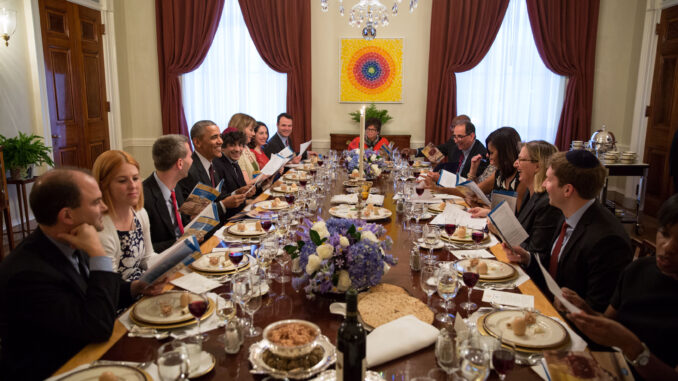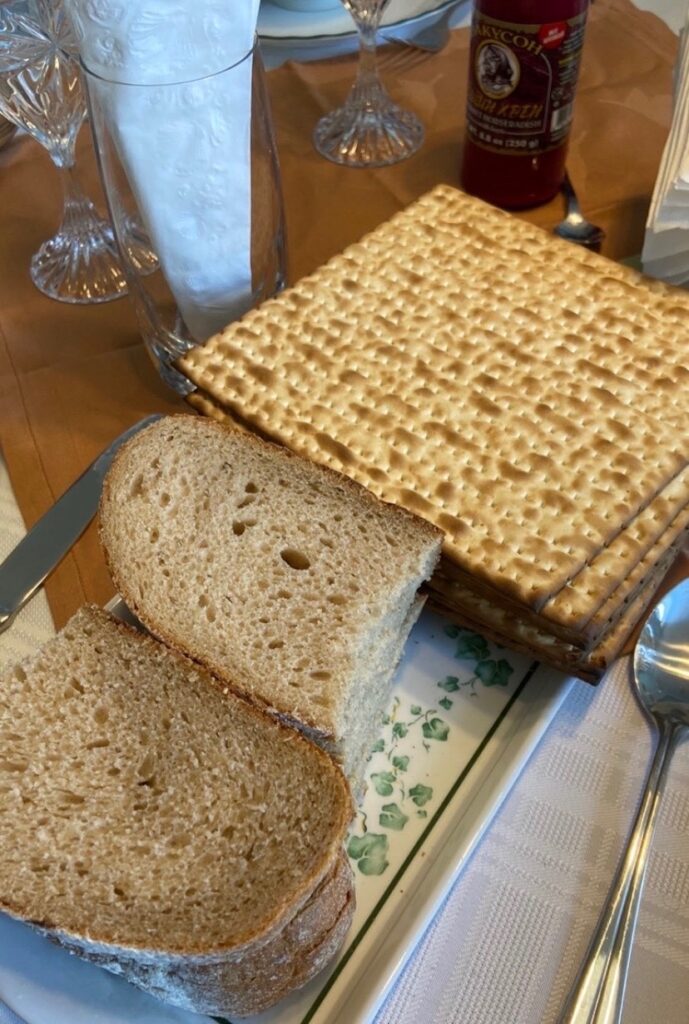
It’s March 28, the first day of Passover. You’ve decided to join a virtual seder service to honor the jubilous holiday honoring the exodus of enslaved Jewish people from Egypt. First step: kiddush, everyone must drink their first of four cups of wine for the evening. First problem: how do you drink wine that’s on the opposite side of the screen?
While this may just sound like a horrible riddle or a humorless joke, this was the reality for many Jewish people in years one and two of the COVID-19 pandemic. A seder service includes prayers and ritualistic eating of specific foods, like maror (bitter herbs in a paste or root form) and lamb shank, to name a couple.
But for those who, in the past, attended seder dinners with friends and family or their Jewish community, the Passover seder may represent another of many religious holidays that seem nearly impossible to do justice in the isolation of social distancing and lockdowns, even with the option to go virtual. After all, not everyone has a lamb shank and horseradish on hand ready to host the service themselves.
Between 2020 and 2021, celebrating Passover and other Jewish holidays — which are often centered around togetherness and, some joke, drinking wine together — became more difficult for two main reasons: the COVID pandemic forced isolation and caused a sense of mourning making it difficult to celebrate triumphantly. Also the steep rise in anti-semitism this year made it harder for some to feel safe celebrating.
Second-year history major Brina Novogrebelsky, who is a self-described woman “on a Jewish, spiritual journey,” has experienced Passover ceremonies in many different capacities. From extremely orthodox (“it was a very long process, we didn’t get to eat until 1 in the morning”) to more casual; from New York to Boston; from celebrating with elders to celebrating with college-aged friends. She’s been able to find something she enjoyed in every form of celebration.
But regarding virtual seder during year one of the pandemic, she says, “It was weird.”

Fortunately, a decline in cases in New York and the increased availability of vaccines meant Novogrebelsky was able to see some of her family during the second year of lockdowns — more than she saw in year one, but still less than usual.
The European Jewish Congress’ “Antisemitism Worldwide 2020” report found that while physical attacks against Jewish people were down on average worldwide, they were up in America. Desecration of Jewish memorials and cemeteries was up by 20% worldwide and there was also a worldwide increase in online antisemitism and blame against Jewish community for the spread of COVID, with some calling it the “Judeovirus.”
Dr. Moshe Kantor, President of the European Jewish Congress said, “In a year of physical restrictions, it is obvious that physical attacks should decrease. However, [there’s an increase of anti-Semitism online and] during times of social crises, Jews are always scapegoated and targeted… Jews have been blamed for the virus and the cure. We hope that what we are witnessing is not the calm before the ‘perfect storm’ of Jew-hatred in the years ahead.”
Some suspect that hate crimes will increase in 2021 as restrictions lessen.
Novogrebelsky says when she learns of hate crimes she isn’t even surprised anymore. “It’s never surprising to me… but that’s always in the back of my head. I know that people hate my people.”
But it won’t minimize how she celebrates any of her favorite holidays. A holiday that’s essentially about celebrating freedom, shouldn’t be reduced because of anti-semitism, she believes.
Also, Novogrebelsky says that necessary ways of celebrating freedom have expanded over time.
At one Passover celebration Novogrebelsky attended in Boston the rabbi said, “‘we need something on the Seder plate to represent our love for the LGBT+ Jews.” She then added an orange slice to the traditional plate.
In the 1980s, feminist, scholar and professor of Jewish studies at Dartmouth College Susannah Heschel began adding a slice of orange to the seder plate, representing the “fruitfulness” of the LGBTQ+ community. At the seder, people would spit out the seeds, to represent rebuking homophobia.
Novogrebelsky explains, “The orange slice seems out of place because no one’s used to seeing it. And that’s kind of how LGBT Jews can feel in certain Jewish spaces. So it’s sort of honoring that feeling and saying, ‘You’re accepted… We love you for being queer and trans and Jewish. That’s a part of Judaism too.’”
“At first I thought it was a sacrilegious thing to change what’s on the plate. But [actually] it just adds a great thing,” Novogrebelsky reflected.
With all of the changes in Passover traditions Novogrebelsky has seen (specifically in seder), she seems excited about most of them. Although this is the second year of celebrating Passover during COVID-19, this year allowed more freedom than last year and most hope that next year’s Passover will be back to normal: where Jewish people can celebrate freedom, freely.

